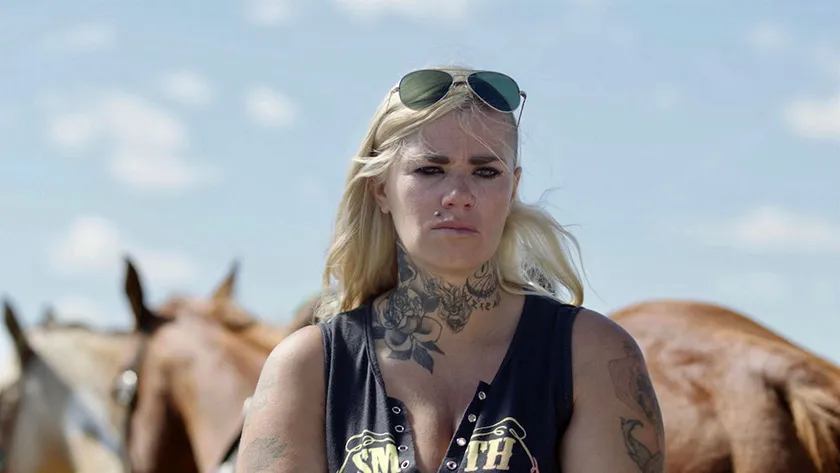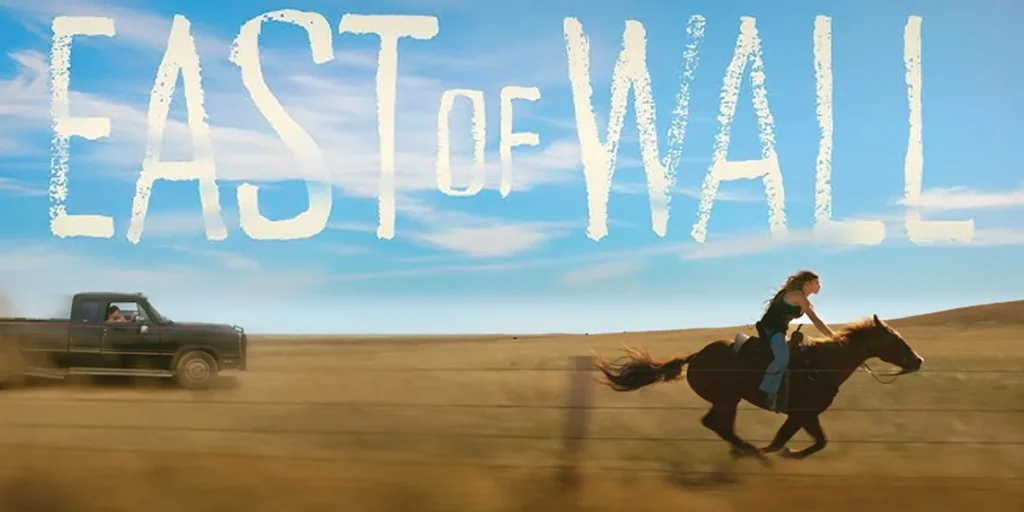Kate Beecroft’s empathetic film East of Wall defies genre while effortlessly depicting the universal ways we cope with loss.
Director: Kate Beecroft
Genre: Drama
Rated: R
Run Time: 97′
U.S. Release: August 15, 2025
U.K. Release: TBA
Where to Watch: In U.S. theaters
In 2019, Kate Beecroft headed off on a trip across the United States to find stories unlike the ones she had felt like she was seeing over and over again on screen. She was searching for new talent and voices audiences haven’t often gotten to hear from with the goal of creating a film of some sort that had yet to reveal itself to her. When she made her way into South Dakota, she never could have expected the threads of her debut film, East of Wall, would be lying out there for her.
At the advice of a stranger who somehow understood exactly the type of story Beecroft had been searching for, Beecroft headed east of a town called Wall to find Tabatha Zimiga and her family waiting for her. While Beecroft initially sought to film the family’s wild cowgirl antics, after spending time with Tabatha and her blended family of neighborhood kids she had taken into her home as her own, she realized there was a larger story to tell and that Tabatha and her family were the only people able to do it any justice.
Over the course of five years, Beecroft crafted a narrative film shot in a cinéma vérité style, telling the true story of Tabatha Zimiga and her family. The movie shows real events that have happened to Zimiga’s blended family and has each member of the family playing slightly fictionalized versions of themselves alongside actors Scoot McNairy and Jennifer Ehle. While East of Wall has fictional aspects and characters sprinkled in to create a more linear story, Beecroft manages to effortlessly weave together fact and fiction to create a film that feels like a living, breathing snapshot of one family’s powerful resilience.

East of Wall tells the story of Tabatha Zimiga and her blended family living on a ranch in the Badlands of South Dakota. Tabatha is widely known in the ranching and rodeo community for her innate ability to train horses due to her deep knowledge and understanding of them. While she is seemingly the best at what she does, she struggles financially to support her large family, all of whom are directly involved in the training and showing of their horses.
When we meet Tabatha, she and her family are grieving the unexpected loss of her late husband, John. Her daughter Porshia, who seems to bear her mother’s same natural gift for riding and connecting to horses, has a particularly hard time adjusting to life without John in it.
John taught Porshia how to ride and since his passing, she finds it difficult to connect with Tabatha in the way she once did. Her memories and passions that used to bring her solace are now overshadowed by the death of her personal hero and her relationship with her mother is clouded by the ways she deems Tabatha’s grieving to be unacceptable.
In the midst of their financial struggles, Roy (Scoot McNairy, of A Complete Unknown), a wealthy outsider impressed by Tabatha’s work but vague with his intentions, offers to buy Tabatha’s ranch while still allowing her family to stand on the land. Tabatha, overwhelmed with the many mouths she has to feed from all the kids she has taken under her wing, now must decide if she should trust this wealthy stranger or place her bets on herself.
East of Wall is one of the most unique films to grace theaters this year. In Beecroft’s directorial debut, she is able to elegantly capture a uniquely singular glimpse into the real lives of people whose stories too often go unheard. Directors like her, who go and seek out stories like Tabatha and Porshia’s and bring them to the masses in uniquely artistic ways, are the pillars that keep the foundation of original storytelling upright.
Tabatha and Porshia’s sheer vulnerability and willingness to allow the darkest moments of their lives to be shown so plainly for others to hopefully find solace in speaks to not only their strength of character but their deep understanding of the importance of art. In their acting debuts, they exude a fearlessness in their performances that drives the heart of the film.
The authentic and powerful performances throughout the movie, coupled with Beecroft’s unique approach to telling the story of the Zimiga’s family, immediately disarm its audience. These factors place the audience directly in the Badlands of South Dakota with Tabatha and Porshia and the rest of the Zimiga’s blended family as they try to navigate both grieving a loved one’s death and making the most out of one’s life at the very same time. With East of Wall, Beecroft drops us in the Zimiga’s family ranch for us to witness all the beauty and all the heartache that stretches across its well-traveled acres.
East of Wall cannot be pigeonholed into one specific type of film. While Beecroft set out to create a western from the eyes of a young woman, centering the story on both Tabatha and Porshia’s perspectives, she accomplishes something much deeper in her story. It’s a film about the real lives of modern cowgirls, the resounding power of empathy and the ways in which grief can both hold us back and set us free.
East of Wall: Movie Plot & Recap
Synopsis:
In the wake of her husband’s death, Tabatha, a young horse trainer, struggles to break even in order to support her blended family. When a wealthy outside benefactor offers to lessen her family’s financial burdens by buying their ranch, Tabatha must decide whether or not to accept his help or find her way on her own terms.
Pros:
- Kate Beecroft’s film is truly singular in vision, style and execution.
- The film’s inability to be pinned to any one particular genre strengthens the audience’s ability to understand and empathize with its lead characters.
- East of Wall challenges a traditional storytelling narrative to champion new talent and unheard voices
Cons:
- Beecroft’s directorial debut at times falters under the film’s sprawling ambition, but not in a way that distracts from her clear potential as a filmmaker.
East of Wall will be released in US theatres on August 15, 2025.

